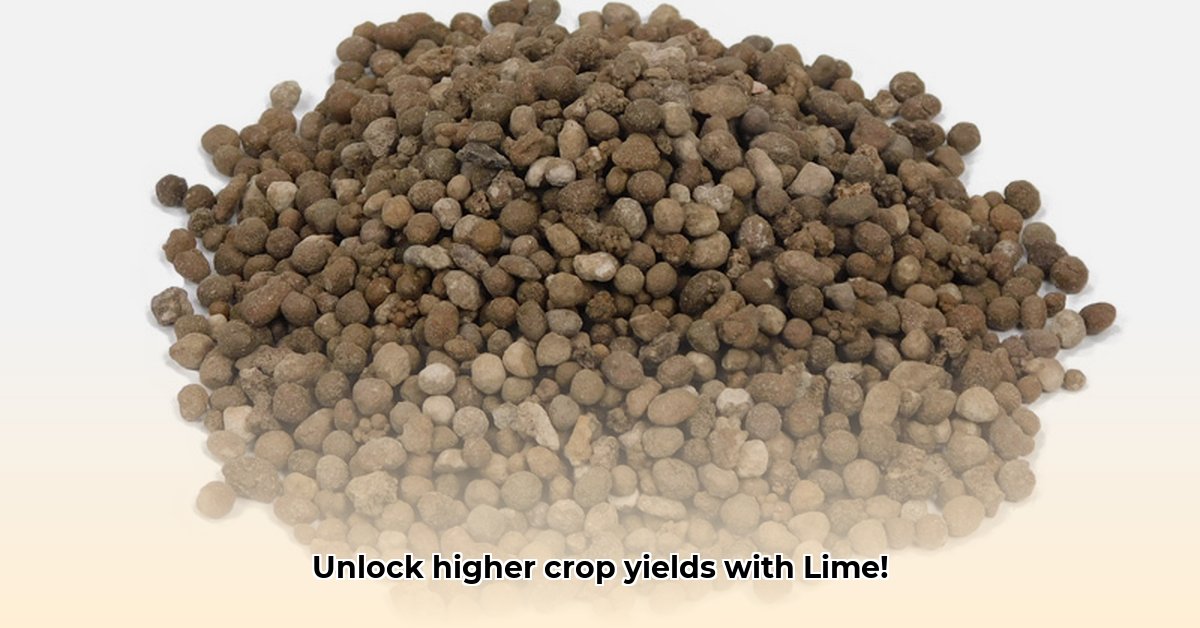
Ever feel like you're fighting a losing battle against unproductive soil? Imagine this: Sarah, a third-generation farmer in Iowa, saw her corn yields dwindling year after year. Her soil was tired, and she knew something had to change. The solution? A simple yet powerful soil amendment readily available at Tractor Supply: agricultural lime. For more on proper watering techniques, see our guide on watering methods. This guide shows you how to use lime effectively to boost your yields and improve your soil health sustainably.
Understanding Soil pH and Lime's Role
Soil pH (a measure of acidity or alkalinity) is like a secret code determining nutrient availability for your plants. Most crops thrive in a slightly acidic to neutral pH range (6.0-7.0), but this varies by crop. Think of it this way: a soil pH that's too acidic or alkaline is like trying to bake a cake with the wrong ingredients – the result won't be ideal! Lime, a natural pH adjuster, acts as a soil balancer, neutralizing excessive acidity and making essential nutrients accessible to your plants. This leads to healthier plants and significantly improved yields. Isn't that a goal worth striving for?
Soil Testing: Don't Guess, Know!
Before you buy a single bag of lime, a soil test is essential. It’s like getting a checkup for your farm. A reliable soil test will accurately reveal your soil's pH, guiding you toward the proper lime application. This crucial step prevents mistakes like over-liming, which can lead to nutrient imbalances. Where can you get a soil test? Your local agricultural extension office or a private soil testing lab are excellent resources. They'll provide you with a detailed report including specific recommendations for your soil. Don't skip this critical first step. It might be the difference between a good harvest and a great one.
Choosing the Right Lime at Tractor Supply: Options & Considerations
Tractor Supply offers various agricultural lime types, typically in convenient 50-pound bags—perfect for smaller operations and targeted applications. The ease of handling and storage makes these bags ideal for various farming scales. Need to amend just a small garden patch? The 50lb bags are perfect! Larger operations might need bulk deliveries; consult with Tractor Supply staff for guidance on suppliers and larger quantities. Remember, the knowledgeable staff at Tractor Supply is there to assist you in choosing the right lime for your specific needs.
Applying Lime Effectively: A Step-by-Step Guide
Applying lime correctly is key to maximizing its benefits. Here's a step-by-step guide:
- Preparation: Clear the area of debris and weeds for even lime distribution.
- Spreading: Use a spreader for even coverage across the field. Manual spreading is acceptable for smaller areas, but ensure consistent distribution.
- Incorporation: Till or disc the lime into the topsoil. This mixes it thoroughly with the soil, accelerating its action.
- Timing: Fall application is generally recommended, allowing ample time for the lime to work before planting. Spring application is also possible, but apply well in advance of planting.
- Watering: Gently water the area after application to activate the lime and aid its incorporation into the soil.
Following these steps correctly ensures the lime effectively improves your soil.
Beyond Lime: A Holistic Approach to Soil Health
Lime is a significant tool, but it's just one piece of the puzzle. Sustainable soil health requires a holistic approach:
- Cover Cropping: Improves soil structure, adds organic matter, and suppresses weeds.
- Crop Rotation: Diversifies nutrients and minimizes pest and disease buildup.
- Composting: Adds organic matter, enhancing fertility and soil structure.
Integrating these practices with lime creates a synergistic effect, leading to robust soil health and thriving crops.
Cost Considerations and Sustainable Practices
While lime is cost-effective, consider the transportation costs and environmental impact. Purchasing lime from local sources reduces transportation emissions, supporting local business and minimizing your carbon footprint. Prioritize sustainable sourcing and practices for long-term economic and environmental benefits. Remember, sustainable farming is good for your bottom line and the planet.
Conclusion: Invest in Your Soil, Increase Your Yields
Using lime from Tractor Supply, coupled with sustainable soil management practices, can significantly improve your soil health and yields. Remember, regular soil testing is crucial for informed decision-making. The benefits of healthy soil—plentiful harvests, reduced need for fertilizers, and a lighter environmental load—make it an investment worth making. Start seeing the results today!